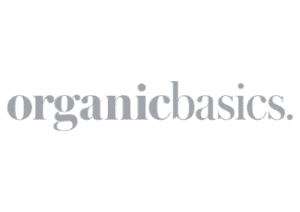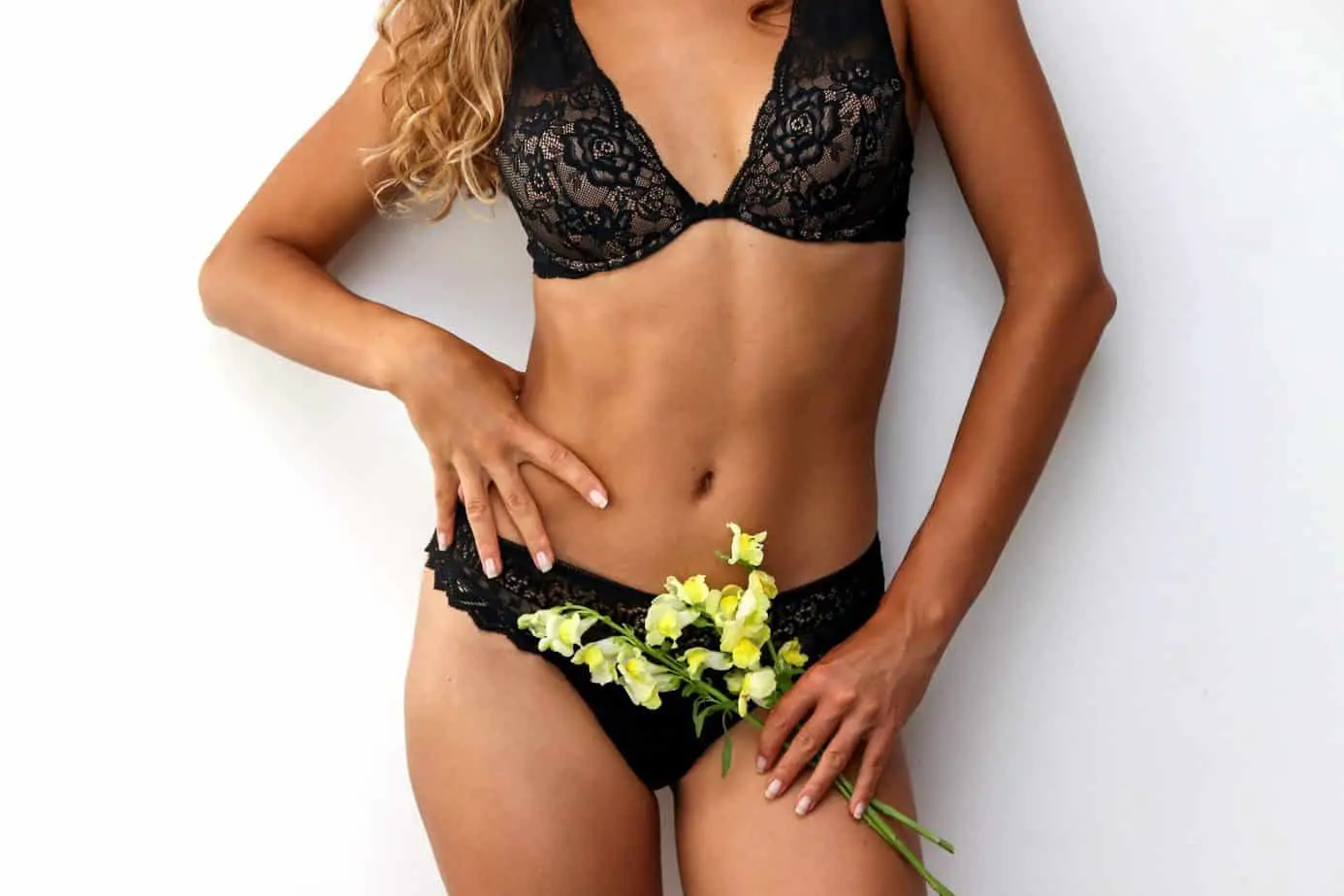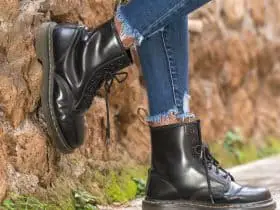Lingerie, a delicate fusion of style, sensuality, and self-expression, has always held a unique place in the world of fashion. Beyond its role in making us feel confident and attractive, lingerie is an intimate undergarment that demands thoughtful consideration, particularly due to its direct contact with our most personal spaces.
Despite what you may have heard from salespeople, finding vegan lingerie isn’t that difficult; plants and synthetic materials combine forces to help us completely forgo anything animal-based.
With a discerning eye and a commitment to both comfort and ethics, I’ve navigated the realm of lingerie brands, uncovering hidden gems that beautifully marry these essential elements. Drawing from my own experiences and trials, I’m thrilled to present a curated and updated collection of the best vegan lingerie brands for 2023. Let’s dive in!
The 7 Best Vegan Lingerie Bands in 2023
1. Uye Surana

In my pursuit of lingerie that seamlessly blends aesthetics, ethics, and comfort, Uye Surana emerged as a radiant star on the horizon. Upon discovering their collection, I was instantly captivated by the marriage of feminine allure and innovative design, all underpinned by a strong commitment to sustainability.
The bras and bralettes from Uye Surana provided an unparalleled experience of comfort. The ingenious fusion of moisture-wicking, durable nylon with the gentle touch of spandex created a sensation of effortless support. This feeling of luxurious ease reminded me of the value of investing in quality intimate wear.
One key standout was Uye Surana’s dedication to anti-rip materials. This not only demonstrated their environmental responsibility but also reassured me that my choice aligned with my own values. Their decision to employ exclusive prints instead of conventional dyeing methods showcased a refreshing creativity that elevated each piece into a work of art.
A particularly remarkable aspect was Uye Surana’s embrace of size inclusivity and diversity. By showcasing models of various body types on their website, they conveyed a commitment to representing a broader audience, a step that resonated deeply with me.
Looking beyond the surface, Uye Surana’s transparency revealed a meticulous process, with a harmonious collaboration between a family-owned Colombian factory and a bustling NYC studio. This commitment to craftsmanship and ethical production added another layer of appreciation to my experience.
Each piece I own stands as a testament to the brand’s dedication to ethical luxury and unparalleled comfort. Uye Surana has undoubtedly secured its place as my go-to choice for lingerie that effortlessly combines aesthetics, ethics, and comfort.
2. WAMA

As someone deeply invested in sustainable living, I’m always on the lookout for products that align with my values. That’s what led me to WAMA’s hemp underwear line, a choice backed by PETA. The idea of eco-friendly comfort and the potential to coordinate with my partner piqued my interest and prompted me to dive into WAMA’s offerings.
What really caught my attention was WAMA’s innovative blend of hemp, organic cotton, and spandex. Hemp, with its reputation for requiring minimal water and being free from harmful chemicals, intrigued me, promising an alternative experience in underwear.
Slipping into WAMA’s hemp underwear was an intriguing experience. The fabric’s durability, along with its gradual softening over time, resonated with my preference for lasting comfort. This practicality effortlessly fit into my daily routine, offering breathability, moisture-wicking, and antimicrobial properties that left traditional choices in the dust.
But there’s more to WAMA than just fabric. Their commitment extends to ethical sourcing, evident through their use of organic cotton. This comprehensive approach solidified my trust in their claims as a genuinely eco-conscious brand.
I was heartened to discover their collaboration with Chinese factories that uphold fair labor practices and conditions. This commitment to transparency added authenticity to their story.
3. Organic Basics

Stepping into the world of conscious fashion, I discovered Organic Basics, a brand that resonates with both my minimalist values and my desire for ethical choices. As a minimalist who seeks authenticity in every facet of life, their collection of non-wired bras and underwear, meticulously crafted from organic and recycled materials, instantly captured my attention.
What truly set Organic Basics apart was their unwavering commitment to GOTS-certified organic cotton. This carefully chosen fabric not only offers the comfort and familiarity of cotton but also embraces a chemical-free cultivation process.
I remember the first time I wore their TENCEL-blend undergarments; the fabric’s breathability felt like a breath of fresh air against my skin. The comfort was unparalleled, and the absorbency ensured I stayed dry throughout the day.
The pieces not only looked sleek and minimalistic but also lived up to the promise of comfort and sustainability. I found myself reaching for them time and again, appreciating how they seamlessly integrated into my daily routine.
What set Organic Basics apart wasn’t just their fabric prowess, but their commitment to transparency. As I navigated their website, I stumbled upon insights into their global factory operations. Reading about their certifications and fair labor practices was a refreshing change, and it solidified my trust in their ethical stance.
If you share a kinship with my appreciation for minimalism, ethical sourcing, and sustainable comfort, Organic Basics is an absolute must-try.
4. Lara Intimates

If you’re looking for a vegan, ethical, and sustainable brand for non-wired bras, bralettes, and briefs, look no further than Lara Intimates. This London-based brand immediately captured my attention with its commitment to redefining lingerie craftsmanship.
The innovative use of deadstock fabric and leftover materials is a testament to Lara Intimates’ dedication to sustainability. When I touched their soft mesh, I couldn’t help but appreciate how they transformed what could have been wasted into a luxurious fabric that I’d be proud to wear. This approach not only reduces their environmental footprint but also showcases a creative approach to minimizing waste that truly resonates with me.
What sets Lara Intimates apart is their meticulous attention to every detail. From the delicate gold rings to the sturdy fabric, hook, eye closures, strapping, and elastic – each element is thoughtfully chosen and crafted.
One day, I decided to slip into a pair of Lara Intimates underwear for my workday. The soft mesh fabric provided unparalleled comfort, reminding me of their dedication to sustainable craftsmanship. As I navigated through my tasks, I noticed that the breathable material kept me cool, and the seamless design ensured irritation-free wear. It was a small but impactful moment, underscoring how mindful fashion choices can elevate everyday experiences.
Lara Intimates upcycles 100% of their own cuttings and scraps, embodying a comprehensive waste reduction strategy that resonates with eco-conscious consumers like me. Even their eco-friendly packaging contributes to their broader sustainability vision.
Lara Intimates’ inclusivity shines through its sizing range, catering to diverse body types. This commitment was further reinforced by the diversity reflected in the models on their website, which assured me that I would find a style that suited both my body and my values.
If you’re searching for a brand that seamlessly blends ethics and elegance, Lara Intimates is more than worth a try.
5. Boody

Some women love the feel of cotton, while others prefer hemp. However, if you’re one of the few that know how epic organic bamboo can be, consider the PETA-approved Boody that caters to both men and women.
What immediately drew me in was their focus on organic bamboo, a material I hadn’t fully explored until now. The sheer luxury of their pieces, combined with an affordable price point, struck a chord with my desire for quality without compromise. Learning that Boody’s viscose was derived from 100% organic bamboo, certified by the OCIA, assured me that I was making the right choice.
Bamboo’s sustainability stems from the fact that we cut it like a lawn, so it regenerates easily and in no time. It also grows in very diverse climates and can handle droughts, so we don’t need to waste water on it. As a pest-resistant plant, it needs no harmful pesticides that end up harming nearby animals. The idea of cutting bamboo like a lawn, enabling it to regenerate swiftly and effortlessly, resonated deeply with my appreciation for nature’s resilience.
The hypoallergenic properties of bamboo make it a safe and comfortable option for intimate wear. The fabric’s moisture-wicking and odor-controlling abilities ensured that my comfort was prioritized throughout the day.
The presence of ECOCERT, OEKO-TEX, and SGS certifications not only validates the superior quality of their materials but also emphasizes their dedication to factory workers’ welfare. With more than 2,065,900 workers benefiting from certifications like WRAP, Boody’s unwavering commitment to ethical practices shines brightly.
6. Thinx

Isn’t lingerie all about boosting our confidence? But what about those times when confidence matters most? Thinx heard the question and answered it with a brilliant vegan solution – period panties.
I vividly recall the first time I wore Thinx period panties. It was a day filled with meetings and deadlines, and I needed reliable protection without compromising on comfort. Thinx delivered seamlessly. The soft, synthetic fabric felt remarkably comfortable against my skin, and the absorbency levels were tailored to my needs, keeping me worry-free throughout the day.
Anyone that has the tiniest knowledge about sustainability cringes when they think about how much waste period products such as plastic-packed tampons and pads leave behind.
What sets Thinx apart isn’t just their innovative design; it’s their commitment to inclusivity. The diverse range of designs catered to my personal style, and the size and gender inclusivity showcased their dedication to embracing every individual’s unique needs.
Beyond that, knowing that my choice supported menstrual equity, accurate sexual education, and access to safe hygiene products made me feel like a part of something greater.
7. Eco Intimates

What’s better than a luxury lingerie brand? Well, an ethical, sustainable, and eco-friendly luxury brand like Eco Intimates, specializing in exquisite organic bras, bralettes, knickers, and more.
From the outset, Eco Intimates’ commitment to GOTS-certified organic cotton caught my attention. The choice of materials reflects their dedication to enriching the soil, preserving water, and championing fair trade farming. The inclusion of undyed lingerie in their range is a testament to their unwavering devotion to vegan principles.
Eco Intimates’ distinctive collections, designed in Australia, exude a soft, feminine, and vintage charm that resonated with my style preferences. Handcrafted by a Balinese family production team, the pieces carry an artisanal touch, a stark contrast to mass-produced alternatives.
The small-scale, slow manufacturing approach results in lingerie that boasts unique designs and exceptional quality. Despite a few silk-infused pieces, which I found to be a minor deviation from veganism, Eco Intimates’ transparency regarding materials allowed me to make informed choices.
How to Know If Lingerie is Vegan or Not
While it might sound ridiculous that you may need help in that category, almost everyone experiences utter confusion the first time that they shop for vegan lingerie themselves. So, here are a few factors to help you know whether that cute piece of lingerie is vegan or not:
1.Vegan Materials
As a vegan, your first and foremost mission is to avoid lingerie that has any animal-based products, such as leather, silk, wool, cashmere, and so on. We can easily divide cruelty-free alternatives into natural and synthetic materials that combine forces to make practical and comfortable undergarments.
Natural Vegan Materials
Natural vegan materials are everything that’s plant-derived, and they tend to be a more environmentally conscious choice since they biodegrade.
Cotton
Cotton is an excellent cruelty-free option for lingerie; it is soft on the skin, highly breathable, and moisture-absorbent. So, cotton lingerie is perfect for wearing all day beneath your everyday clothes.
There are many variations of cotton that you can find in the undergarment world, such as the elegantly draping cotton satin, cotton jersey, mulmul soft muslin, and more.
The best and most ethical option in cotton is organic cotton, of course. It grows with much less water, no pesticides, and doesn’t indirectly kill animals the way that traditional cotton may do.
Hemp
Hemp is an even more sustainable option than cotton at its best behavior. No, scratch that. Hemp is one of the most sustainable crops in the world. Its short harvest cycle, land-saving tall fibers, and virtual lack of thirst put it on top for vegan and ethical shoppers.
It has antimicrobial properties that come in handy after a sweaty or interesting day. In fact, these antimicrobial properties are what enable hemp crops to grow without pesticides or harmful chemicals.
Hemp is also a much sturdier and more practical fabric than cotton, and yet, it feels incredibly soft and comfortable, which is why it’s considered a premium lingerie fabric.
Bamboo
Like hemp, bamboo is an eco-friendly hero that deservingly made its way to the lingerie world. As a plant that tolerates drought just fine, it doesn’t waste so much water as cotton. Also, we don’t need to replant after harvest, which is great news for the environment.
It’s known for its thermo-regulating properties. So, if you wear it in extreme weather, it won’t affect it. Also, it’s stretchier than cotton and hemp, which comes in handy for comfortable intimates. Its hypoallergenic and breathable nature also makes it comfortable. Plus, its high strength-to-weight ratio means that your bamboo lingerie will stand the test of time.
Synthetic Vegan Materials
Synthetic vegan materials are anything that’s man-made, completely exclusive of anything animal-based.
Spandex
You can look anywhere you want, but you won’t find any animal-based product that replaces the stretchability and recovery of spandex.
It usually appears in small percentages, and it gets the practical aspect of the job done. Also, it is lightweight, which gives you complete freedom of movement. Finally, you’d be impressed by how long this man-made fabric can last.
Nylon
Yes, the toothbrush bristles turned into a fabric that invaded every part of everyone’s lives, vegan or not. There are reasons for nylon’s popularity, of course.
Like spandex, it has a lightly elastic nature that makes it ideal for cradling your private parts. Its wear-resistance is impressive; let’s be real, you need that in a bra, with the way that we treat them. Its moisture-wicking nature enables it to find the nuisance that is underboob sweat. Plus, it is pretty durable. Consider recycled nylon as an ethical option.
Rayon
The semi-synthetic fabric that is rayon brings you the softness and elegance of silk without the ridiculously high price point or the shocking cruelty behind its origin. Also, the way it drapes is heavenly, especially on kimono robes.
Like cotton, it is breathable and moisture-absorbent, so your private parts won’t feel like they’re suffocating when rayon is involved. Furthermore, it dyes easily, giving you the most versatile selection of colors to fit your personal taste like a glove.
2. Deadstock Fabric
One thing that you’ll find that a lot of vegan manufacturers have in common is the use or reliance on deadstock fabric, which is the excess that other manufacturers left over. Basically, it would have ended up in landfills and contributed to an alarming textile waste issue.
Vox says that the United States generates 25 billion pounds of textiles per year. According to the Environmental Protection Agency in the United States, 11.3 million tons of municipal solid waste textiles ended up in landfills in 2018 alone. That’s too much!
Hence, the vegan and sustainable fashion industry has embraced the use of surplus fabrics to create functional and comfortable clothing that seamlessly conceals its upcycled origins. Fortunately, this is very common in vegan lingerie.
3. Labeling
A common practice among strictly vegan manufacturers is to prominently display their vegan credentials in the form of labels and certifications. Is the lingerie set that you have in mind PETA-approved? Does it have a “certified vegan” logo? If you spot any certifications, badges, or logos, read them carefully, especially if they show an animal’s face.
4. Hands-on Experience
While online shopping is predominant, even in 2023, it’s still valuable to physically assess the texture of lingerie in a store. For those accustomed to synthetic fabrics, animal-based materials will have a distinct tactile sensation, and the reverse is also true. If you happen to be shopping in person, locate a nearby lingerie store and personally experience the fabricsf.
5. Pay attention to details
Almost every vegan at some point has made the same mistake: they buy a vegan fashion item that turns out to be just mostly vegan because it has leather accents or horn buttons. It’s an honest mistake, but you can avoid it by keeping in mind that details matter.
Final Thoughts
I hope my guide to the best vegan lingerie brands has helped you discover undergarments that align with your values and provide both comfort and ethics. Here’s a quick summary of the highlights from my list:
Looking for unique and eco-conscious options? Uye Surana stands out among the best vegan lingerie brands.
If sustainability is your focus, WAMA’s hemp-based lingerie is a standout choice.
For those seeking organic and recycled materials, Organic Basics lives up to its name.
These brands offer something special, making your search for the best vegan lingerie a little easier.










![[Company Profile] Will's Vegan Shoes: The Best Products They Offer 45 Will's Vegan Shoes](https://getvegan.com/wp-content/uploads/2021/10/wills-vegan-shoes-280x210.jpg)

Leave a Reply